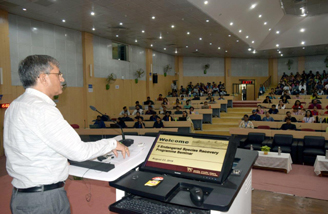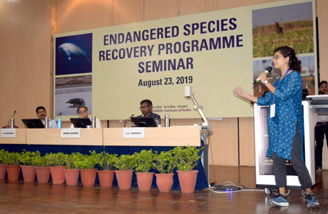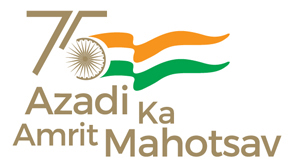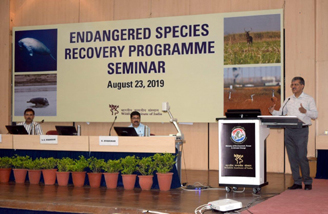2nd Endangered Species Recovery Programme Seminar
|
The Endangered Species Recovery Programs are being adopting a multi-pronged approach that includes conservation research, technology aided management support, training and capacity building of the implementing agencies, monitoring of population and habitats, stakeholder sensitization and mobilization, and mitigation of threats in priority habitats. The goal of this program is to ensure long term persistence of these species in wild through multi-stakeholder partnerships wherein the conservation contribution of local community is recognized and incentivized. The program envisages a close cooperation and collaboration between different State Governments, where these species occur, and WII, key civil society organizations and MoEFCC for effective and timely implementation of the proposed conservation measures. A total of 20 presentations were made covering various aspects of conservation of this species including its status, ecology, habitat, community participation, awareness programme, etc. Dr. S.K. Khanduri, Former IGF(WL), MoEF&CC was the chairperson of the Seminar. Managers from various states and more than 200 researchers participated in this one day workshop. It was informed that the major threats to these four species have been at declining trent but getting the visual impact of this programme on population size may take 10 to 20 years as these are slow breeding animals. Dr Khanduri expressed his satisfaction about the progress of the project and appreciated the collective efforts of Wildlife Institute of India, State Forest Departments, Indian Navy, Indian Coast Guard, CAMPA Authority of MoEF&CC, Wildlife Division of MoEF&CC and NGOs to recover these highly threated species. Earlier, Dr. K. Sivakumar welcomed the all participants including the Chairperson to the Seminar and provided background of seminar. Later, Dr Y.V. Jhala in his opening remarks explained the background of endangered species programme and its progress briefly. |
|
 |
 |
 |
 |
 |
 |
Last Updated: August 24, 2019


 The 2nd Endangered Species Recovery Programme Seminar was conducted at the Wildlife Institute of India on 23rd August, 2019.
The 2nd Endangered Species Recovery Programme Seminar was conducted at the Wildlife Institute of India on 23rd August, 2019. 






